Um Elefante no Palácio de Cristal 2021
The programme Um Elefante no Palácio de Cristal is based on an invitation made by the Galeria Municipal do Porto to three curators and an artistic collective for development of a public programme about the Primeira Exposição Colonial Portuguesa, held in 1934 in the Gardens of the Palácio de Cristal - whose mascot was the elephant, which at the time was materialised in porcelain souvenirs and a majestic sculpture placed on top of the Palácio de Cristal.
Unearthing historical visions and vestiges, this programmatic axis proposes to revisit the event and expose its implications for the contemporary era, through three sub-themes:
Ética do Olhar e da Representação raises questions about visual literacy, focusing on the problem of 'who looks at who', 'where do they look from' and 'how do they look', commencing with the existing visual records of the First Portuguese Colonial Exhibition to move towards a critical reflection orientated via contemporary perspectives.
Colonialismo, Capitalismo e Religião evokes the relationship between political, economic and ideological power, exploring themes such as material and production relations, colonial mining policy, slavery, forced labour and the Statute of Indigenous People.
Encenação do Império Colonial conducts a historical-political analysis of this and other colonial exhibitions and their reflections in current memory and the urban space.
A programme of sessions is proposed within each sub-theme for the general public and schools, which includes debates, film screenings, workshops and courses, guided by researchers and artists.
The curatorship is by Alexandra Balona, Melissa Rodrigues and Nuno Coelho and has the participation of InterStruct Collective.
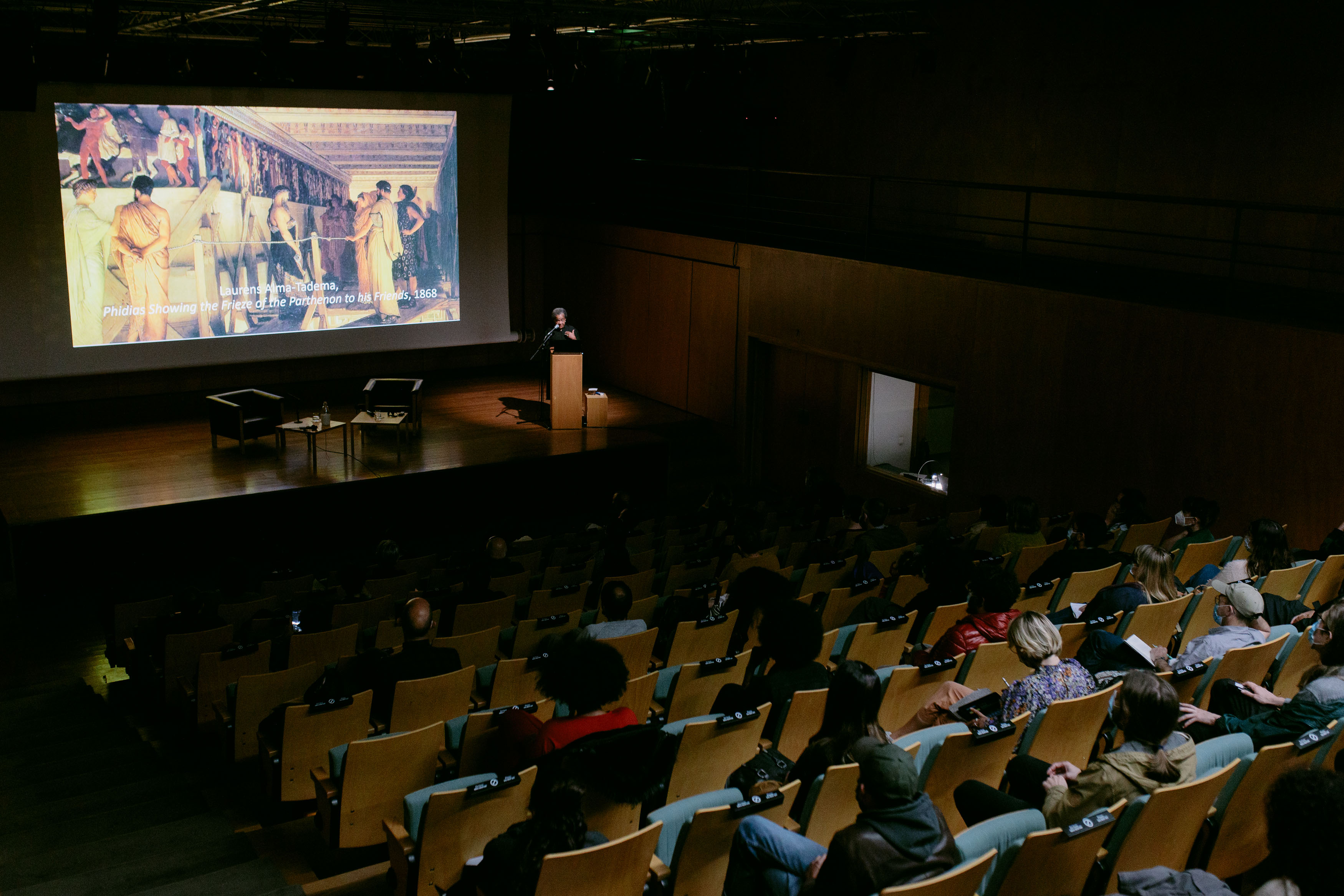

Thursday, May 13, at 7pm
Conference with Bambi Ceuppens. Moderation by Nuno Coelho
ping! — Programa de Incursão à Galeria
Um Elefante no Palácio de Cristal / Ética do Olhar e da Representação
Bambi Ceuppens will present an analysis of the Colonial Exhibitions held in Porto, in 1934, and in Brussels, in 1958, focusing on the problem of human zoos and the ethical implications of these events in the contemporary era.
Bambi Ceuppens holds a PhD in Social Anthropology and works as a senior researcher and curator at the Royal Museum for Central Africa (Belgium). Her research focuses on the Belgian-Congolese past, Congolese arts and culture and decoloniality. She played a crucial role in renovation of RMCA which reopened doors in 2018 with a new focus on contemporary Africa, adopting a critical retrospective of the colonial past. Recently, she co-curated the exhibitions Congo Art Works: Popular Painting (BOZAR, Belgium, 2016– 2017; Garage Museum of Contemporary Art, Moscow, 2017) and Congo Stars (Kunsthaus Graz, Austria, 2018; Kunsthalle Tübingen, Germany, 2019). She teaches Anthropology of the Arts at KASK School of Arts and at Saint Lucas School of Arts (Belgium).
Nuno Coelho is a designer, curator, professor at the Faculty of Science and Technology of the University of Coimbra and a researcher at CEIS20 - Department of Informatics Engineering of the Faculty of Sciences and Technology of the University of Coimbra. With a PhD in Contemporary Art, He has been working on topics related to identity and memory by exploring the visual imagery of historic Portuguese trademarks.He is a member of the Rampa association. He has recently curated and organised collective design exhibitions and public conferences and has two books published.
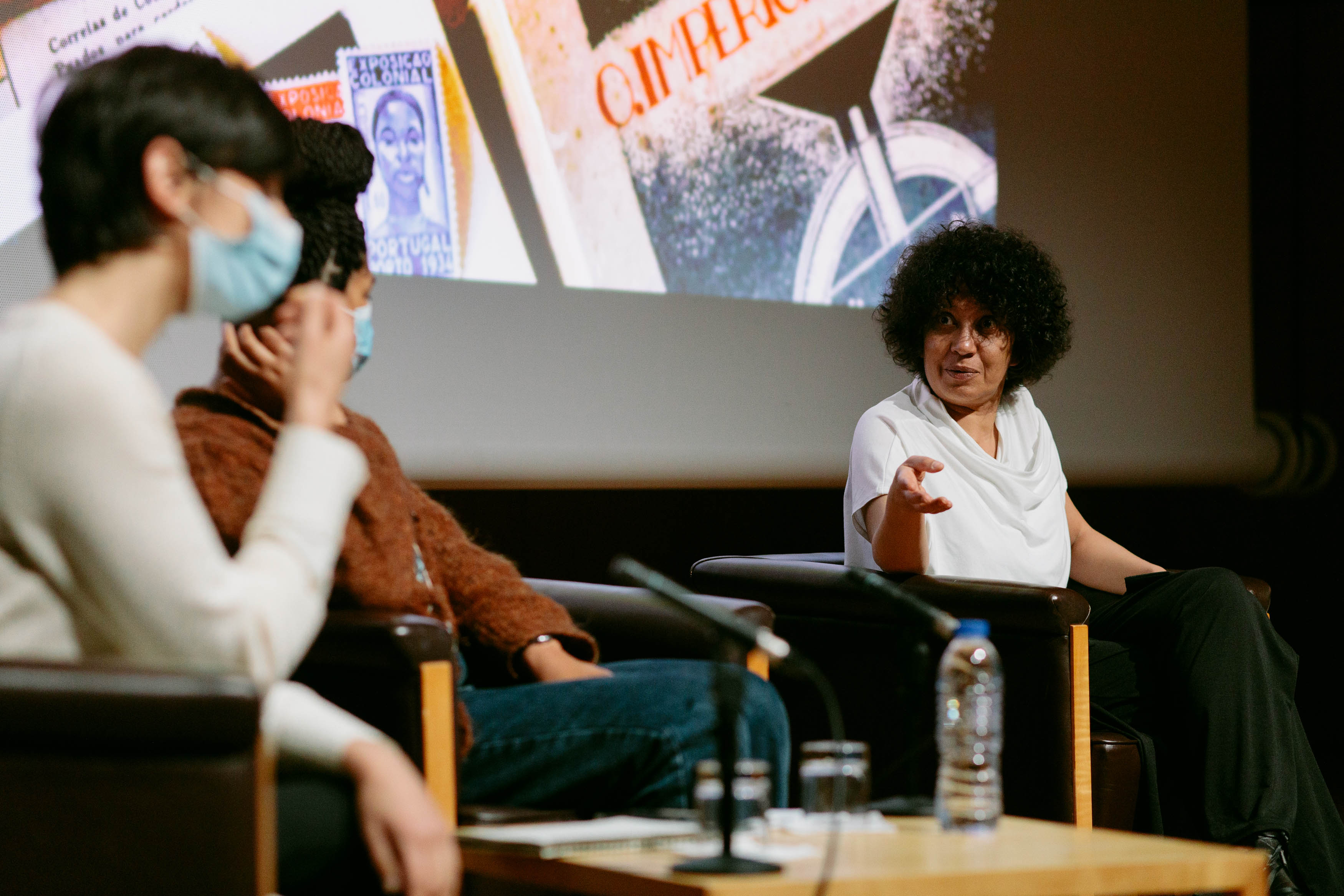

Friday, May 14, at 7pm
Film analysis by Ana Cristina Pereira
ping! — Programa de Incursão à Galeria
Um Elefante no Palácio de Cristal / Ética do Olhar e da Representação
In this session, excerpts from various documentary films about the Primeira Exposição Colonial Portuguesa will be shown and commented, followed by a debate, open to the general public, on issues of visual literacy and the ethics of representation.
Actress and stage director since 1996 and teacher in secondary and higher education since 2001, Ana Cristina Pereira (also known as Kitty Furtado) holds a PhD in Cultural Studies from the University of Minho, with the thesis Alteridade e identidade na ficção cinematográfica em Portugal e em Moçambique. Her main research interests are themes such as racism, social identity, social representations and cultural memory in cinema, from a post-colonial and intersectional perspective, on which she has published several scientific articles. She is a researcher on the (THE)OTHERING project and a member of the Núcleo Anti‑Racista of Porto.
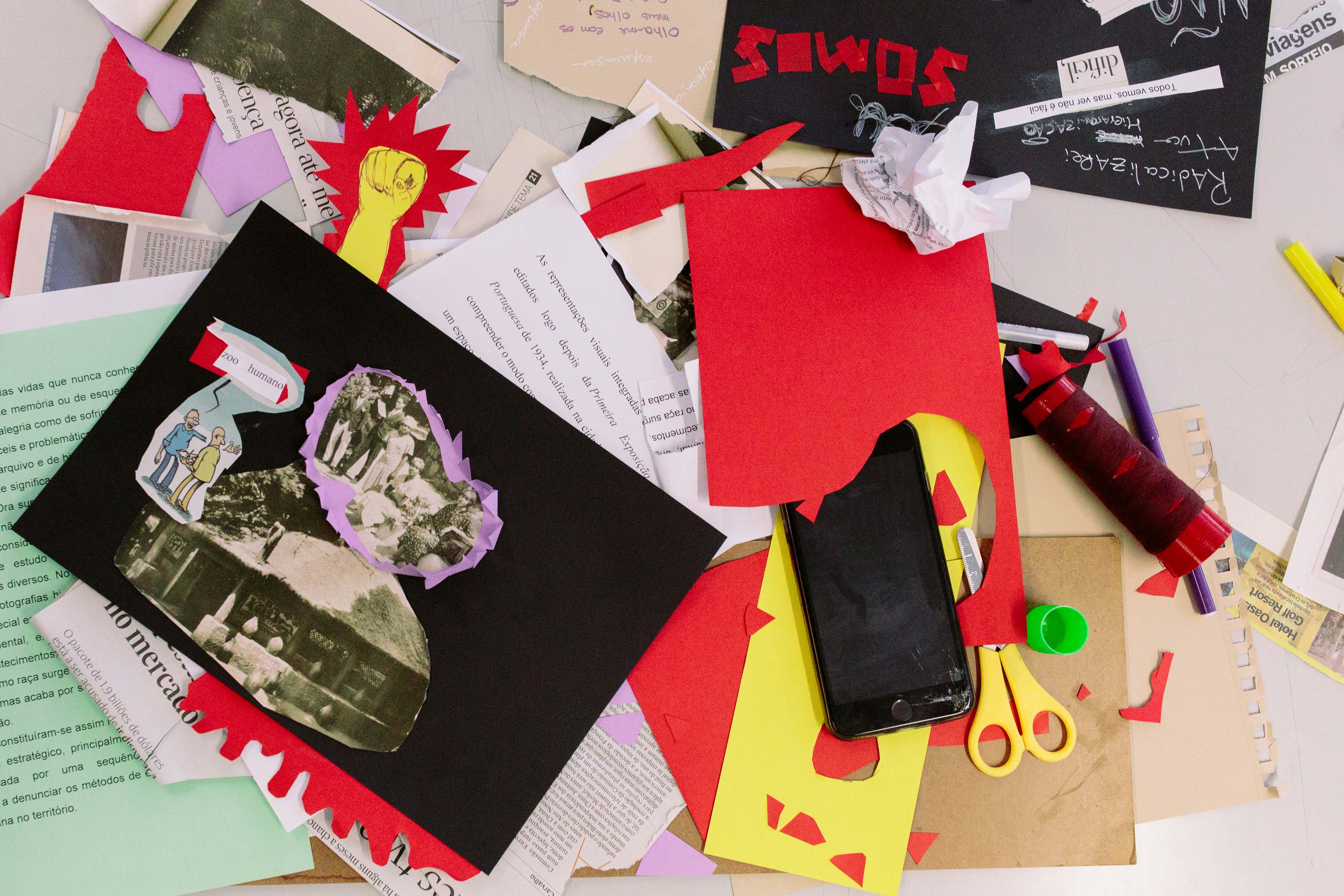

Friday, May 14, from 10am to 12am
Workshop with Sofia Yala Rodrigues
ping! — Programa de Incursão à Galeria
Um Elefante no Palácio de Cristal / Nas Escolas / 3º Ciclo
This workshop will propose a practical and poetic exercise of observation, analysis and reframing of archival images, for a critical reflection on ethics and representation of the black body, ranging from colonial and post-colonial imagery to contemporary visual culture.
Visual artist with a degree in African Studies from the Faculdade de Letras da Universidade de Lisboa, Sofia Yala Rodrigues is currently attending her Master's in Film and Photography at the University of Derby. She has a special interest in archives, transatlantic stories and new imaginary. Recently, she participated in the Residencies À Margem do Cinema Português: Residência Artística Afroeuropeans (CEIS20 — Centro de Estudos Interdisciplinares do Século XX da Universidade de Coimbra, Portugal, 2019) and Catchupa Factory Artist Residency 2018 (Associação Olho‑de‑gente, Cabo Verde, 2018).
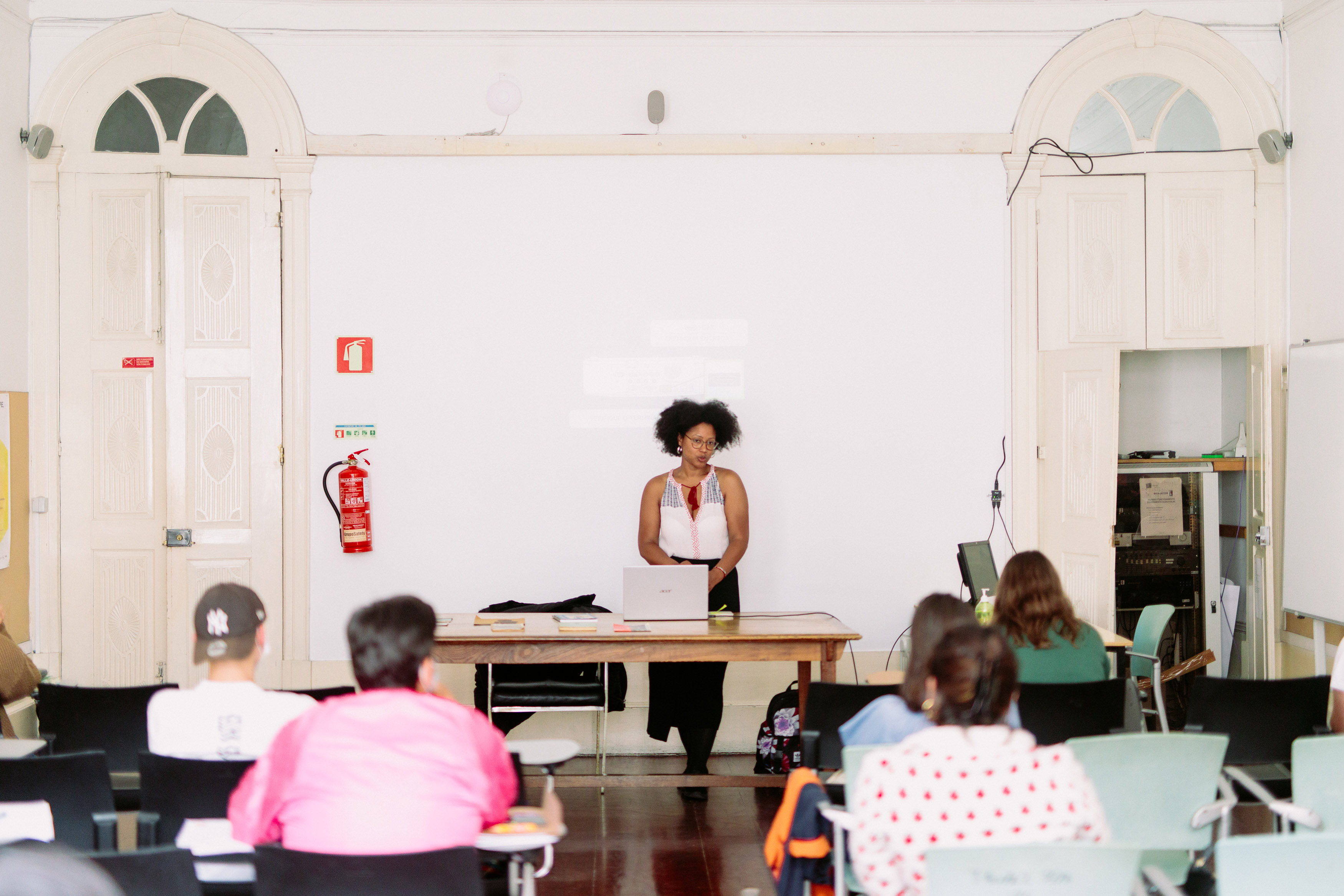

Friday, May 14, from 2pm to 4pm
Workshop with Gisela Casimiro
ping! — Programa de Incursão à Galeria
Um Elefante no Palácio de Cristal / Nas Escolas / Ensino Secundário e Superior
Based on her work as a writer and artist, Gisela Casimiro will examine, question and unveil the interconnections between colonialism, the image and representation.
Writer, artist and activist, Gisela Casimiro heads the Culture department at INMUNE – Instituto da Mulher Negra in Portugal. She published her first book of poems entitled Erosão (2018), was part of anthologies such as Rio das Pérolas (2020) and Venceremos! Discursos escolhidos de Thomas Sankara (2020) and participates in As Penélopes (2021). In recent years, she has been a regular columnist for Hoje Macau, Buala and Contemporânea. She also presented exhibitions in spaces such as O Armário, Galeria Zé dos Bois, Galeria Balcony and Museu Nacional de Etnologia.
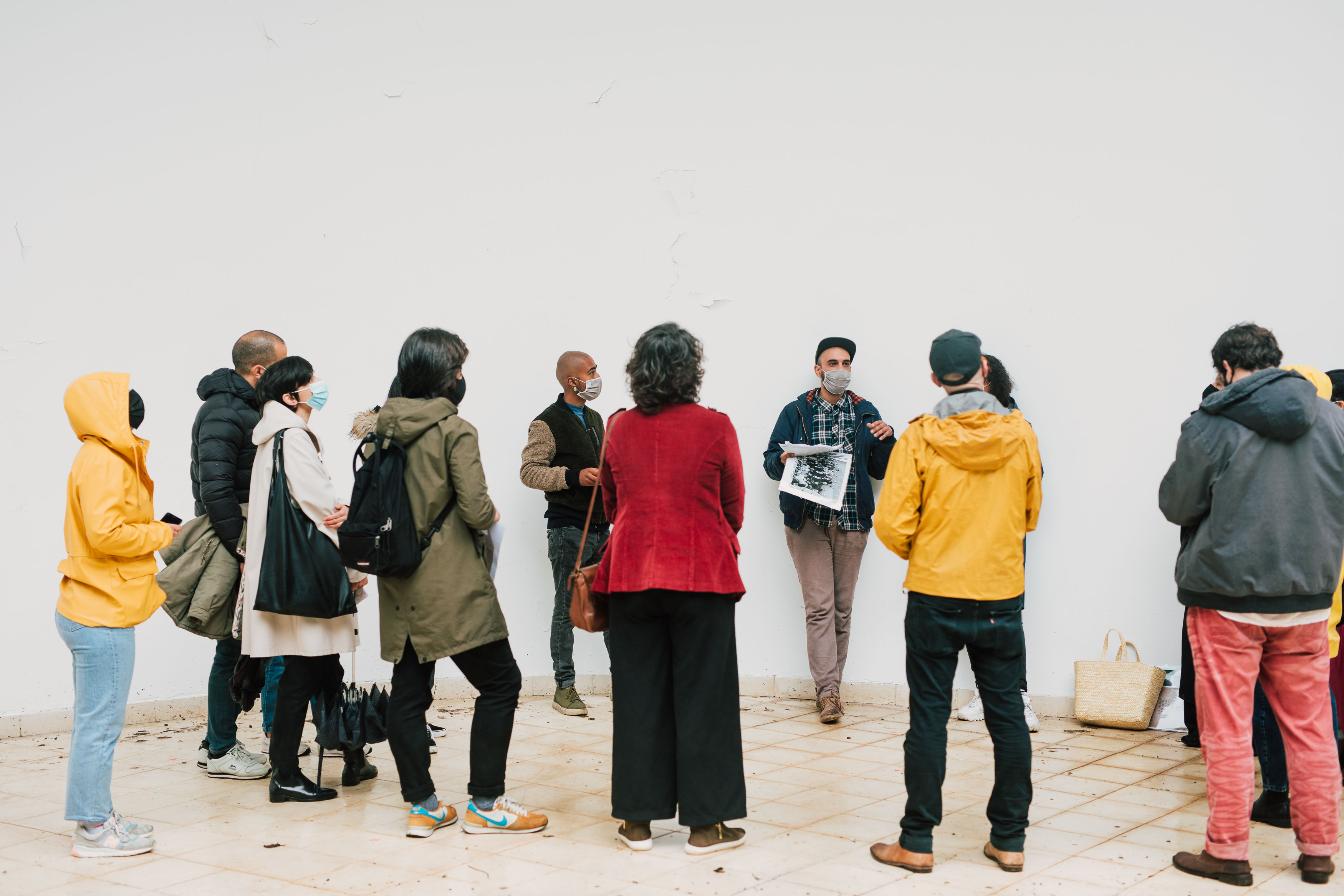

Saturday, May 15, from 10am to 1pm
ATLAS I – Workshop and walk along the gardens with InterStruct Collective
ping! — Programa de Incursão à Galeria
Um Elefante no Palácio de Cristal / Ética do Olhar e da Representação
In this workshop, a relational cartography will be drawn between images, words and concepts related to the Primeira Exposição Colonial Portuguesa and its legacy.
Due to the relevance of the work developed around the Primeira Exposição Colonial Portuguesa (Porto, Portugal, 1934), InterStruct Collective was invited to carry out the ATLAS project, which crosses and unites the different moments of this program. Created in 2018, the collective aims to foster a dialogue around interculturalism, providing a discursive platform where people from different cultural backgrounds can collaborate, propose interventions and stage artistic projects of social significance. InterStruct Collective is composed by members and associates are located in countries in Europe and America — Claire Sivier, Desirée Desmarattes, Isabel Stein, Melissa Rodrigues, Miguel F., Sebastian Ioan and Vijay Patel —, allowing for broader points of reference and expanding the discussion.
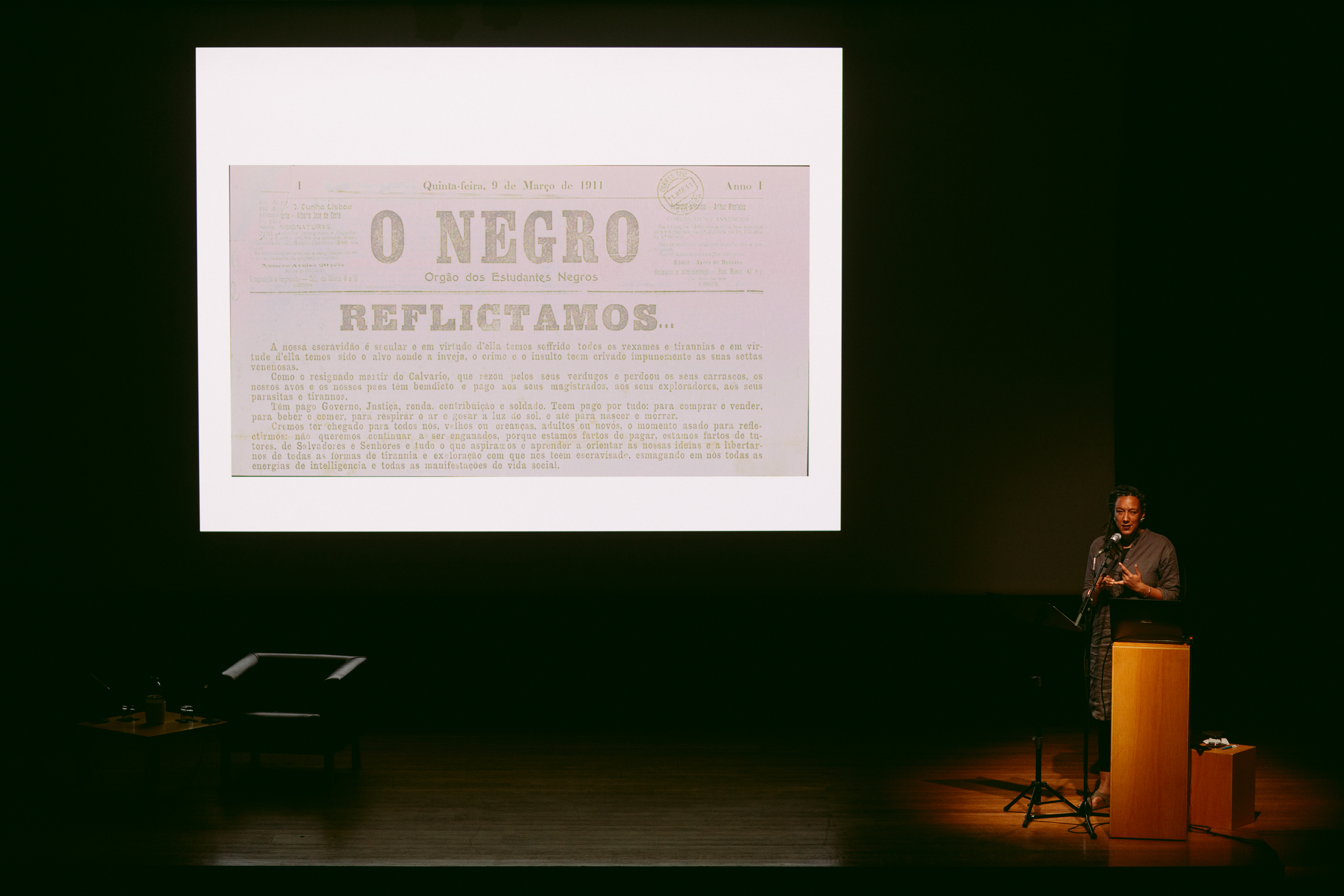

Thursday, May 27. at 7pm
Conference with Cristina Roldão. Moderation by Melissa Rodrigues
ping! — Programa de Incursão à Galeria
Um Elefante no Palácio de Cristal / Colonialismo, Capitalismo e Religião
Based on her research into education and pedagogical programmes in Portugal, Cristina Roldão will propose a reflection about ways of perpetuating coloniality in the social, economic and political spheres, through analysis of concepts such as Lusotropicalism, colonial legacy, white privilege, among others.
Cristina Roldão is a sociologist, guest professor at the Higher School of Education of the Polytechnic Institute of Setúbal, researcher at CIES-IUL — Center for Research and Studies in Sociology and member of the coordination of the thematic section Classes, Inequalities and Public Policies of the Portuguese Association of Sociology. Social inequalities at school are her main research domain, with a particular focus on the processes of exclusion and institutional racism that affect people of African descent in Portuguese society, issues she addresses in her doctoral thesis and in recent research of which she was part of, such as Caminhos escolares de jovens africanos (PALOP) who access higher education (2015).
Melissa Rodrigues is performer and art-educator. She completed postgraduate/specialization studies in Performance, at the Department of Fine Arts of the University of Porto and earned an undergraduate degree in Anthropology from the Department of Social and Human Sciences of NOVA University of Lisbon. She studied Contemporary Dance and Performing Arts at c.e.m. - centro em movimento (Lisbon). As a researcher in the areas of Performance and Visual Culture, she has developed research in Image and Representation of the Black Body, in collaboration with visual artists, social scientists and performers. Melissa is a member of the InterStruct Collective, the Rampa association and the Porto Anti‑Racist Nucleus.
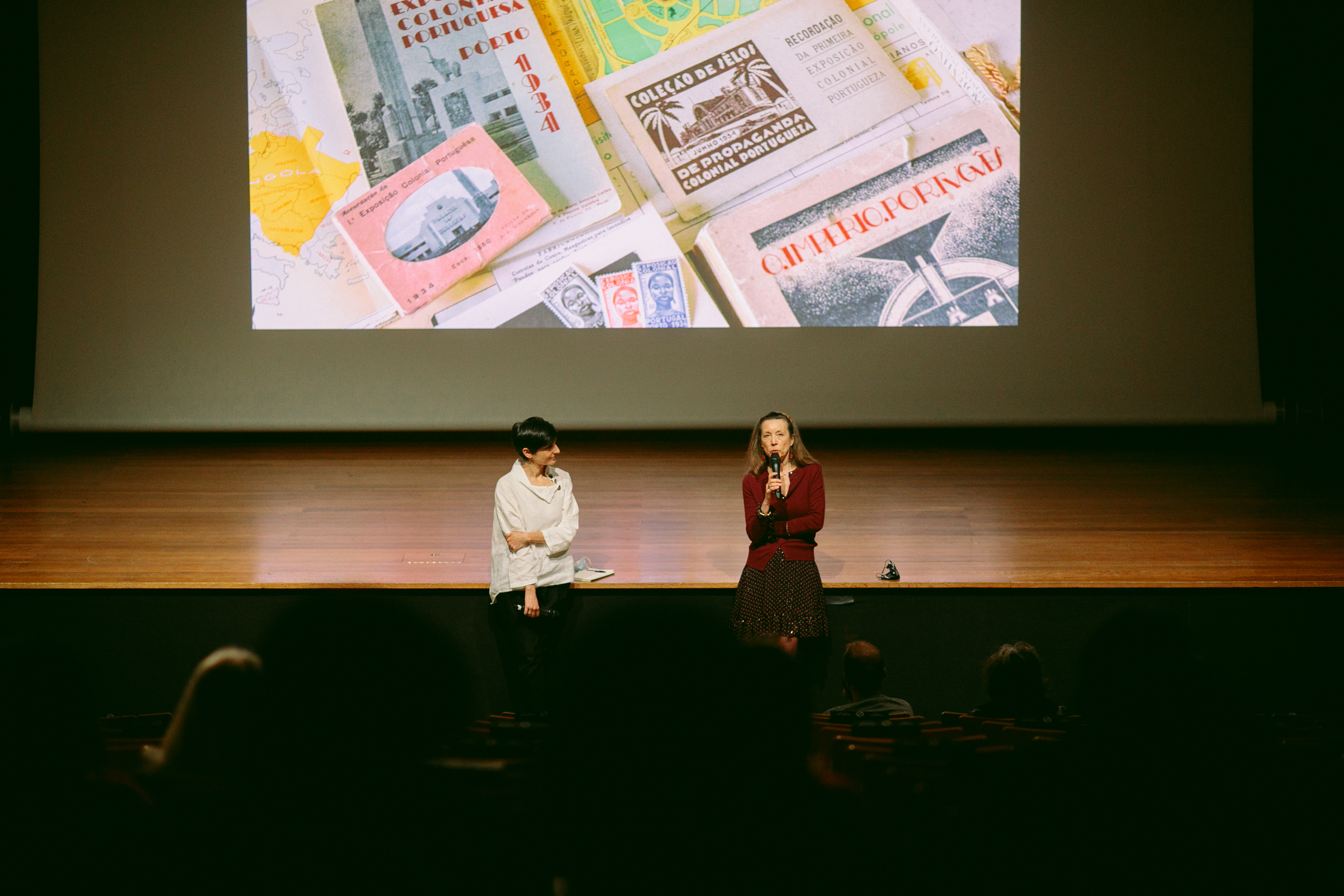

Friday, May 28, at 7pm
Cinema session – Ghosts of an Empire, by Ariel de Bigault
ping! — Programa de Incursão à Galeria
Um Elefante no Palácio de Cristal / Colonialismo, Capitalismo e Religião
Imperial and colonial history has been told and reinvented by Portuguese cinema. Ghosts of an Empire have been running through this cinematographic imagery since the beginning of the 20th century... 100 years of films. The documentaries and fictions of the colonial past are contrasted with contemporary films and perspectives. Seven Portuguese filmmakers - Fernando Matos Silva, João Botelho, Margarida Cardoso, Hugo Vieira da Silva, Ivo M. Ferreira, Manuel Faria de Almeida, Joaquim Lopes Barbosa - as well as José Manuel Costa, director of the Cinemateca, and Maria do Carmo Piçarra, researcher, open the vaults of memory, dialoguing with the actors Ângelo Torres and Orlando Sérgio. They uncover the myths of the discoveries, an imperial fiction, a factory of the colonial epic, as masks of domination... ghosts that persist even today. The film develops a path of emotions in memories and very current experiences.
Author and director Ariel de Bigault works between France, Portugal, Brazil and Africa. Her work has been connected to the routes of the Lusophone World. After beginning her cinematographic journey with some documentaries in Portugal, she directed the series Éclats Noirs du Samba, that brings together huge Afro-Brazilian artists, including Gilberto Gil, Martinho da Vila and Grande Othelo and Margem Atlântica (2006), which portrays African immigrants, people from different ages, who are building a place and an identity in Lisbon. In 2020, she finished Fantasmas do Império. At the same time, she carried out research and dissemination work on contemporary African music, especially Lusophone.
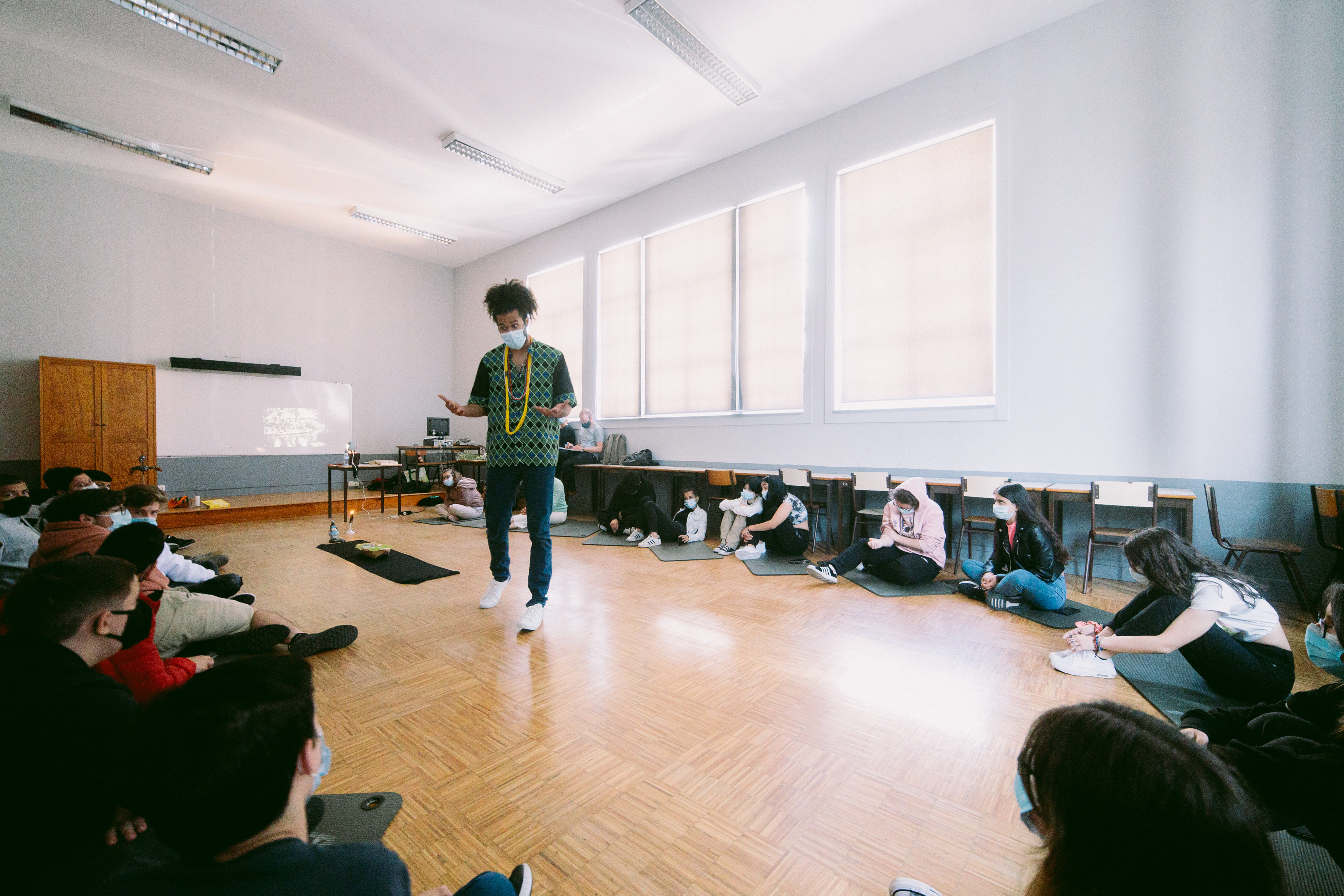

Friday, May 28, from 10am to 12am
Workshop with Dori Nigro
ping! — Programa de Incursão à Galeria
Um Elefante no Palácio de Cristal / Nas Escolas / 2º e 3º ciclo
In this workshop, Dori Nigro proposes to create an intimate space for reflection and for action-redress in relation to colonial history, the past and present, with reference to memories and narratives of dehumanisation and resistance.
Performer and art-educator, Dori Nigro currently resides in Porto. PhD student in Contemporary Art, from the Universidade de Coimbra, and master in Contemporary Artistic Practices, from the Faculdade de Belas Artes do Porto, he also has a specialization in Art Education from the Universidade Católica de Pernambuco and a bachelor's degree in Social Communication/Photography, from the ssociação de Ensino Superior de Olinda. He is a creative member of the collective of artists C3 (Portugal/Serbia/Spain, 2015), member of the Núcleo Anti‑Racista do Porto and co-creator of the collective of artistic creation Tuia de Artifícios (Brazil/Portugal, 2007), which works by inviting the community to share artistic experiences through performance creation exercises and interventions in intimate or public spaces.
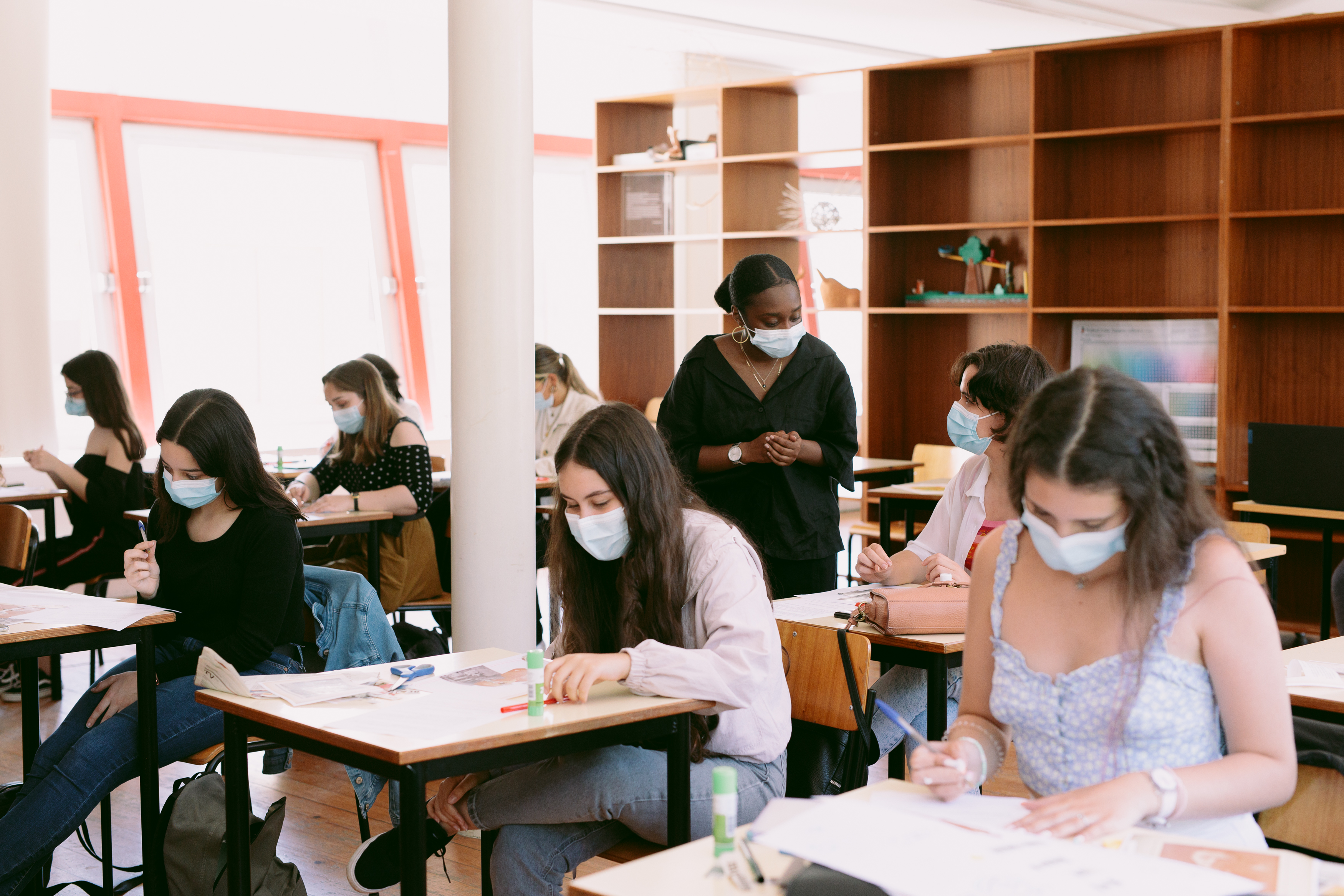

Friday, May 28, from 2pm to 4pm
Workshop with Inês Borges
ping! — Programa de Incursão à Galeria
Um Elefante no Palácio de Cristal / Nas Escolas / Ensino Secundário e Superior
Commencing with the analysis of graphic materials developed in the framework of the Primeira Exposição Colonial Portuguesa, this workshop will discuss the problem of the lack of representation of black people in the field of graphic design, in order to create various narratives and stories of blackness.
Graphic and communication designer, Inês Borges has focused her work in the areas of typography, branding and editorial projects. She graduated in Communication Design from the Universidade Lusófona de Humanidades e Tecnologias and, in 2019, completed her master's degree in Graphic Design from the Escola Superior de Artes e Design das Caldas da Rainha do Instituto Politécnico de Leiria, with a dissertation entitled Graphic Design as a form of decolonization — A study and reflection on the visual discourses of discrimination and ways of combating them.
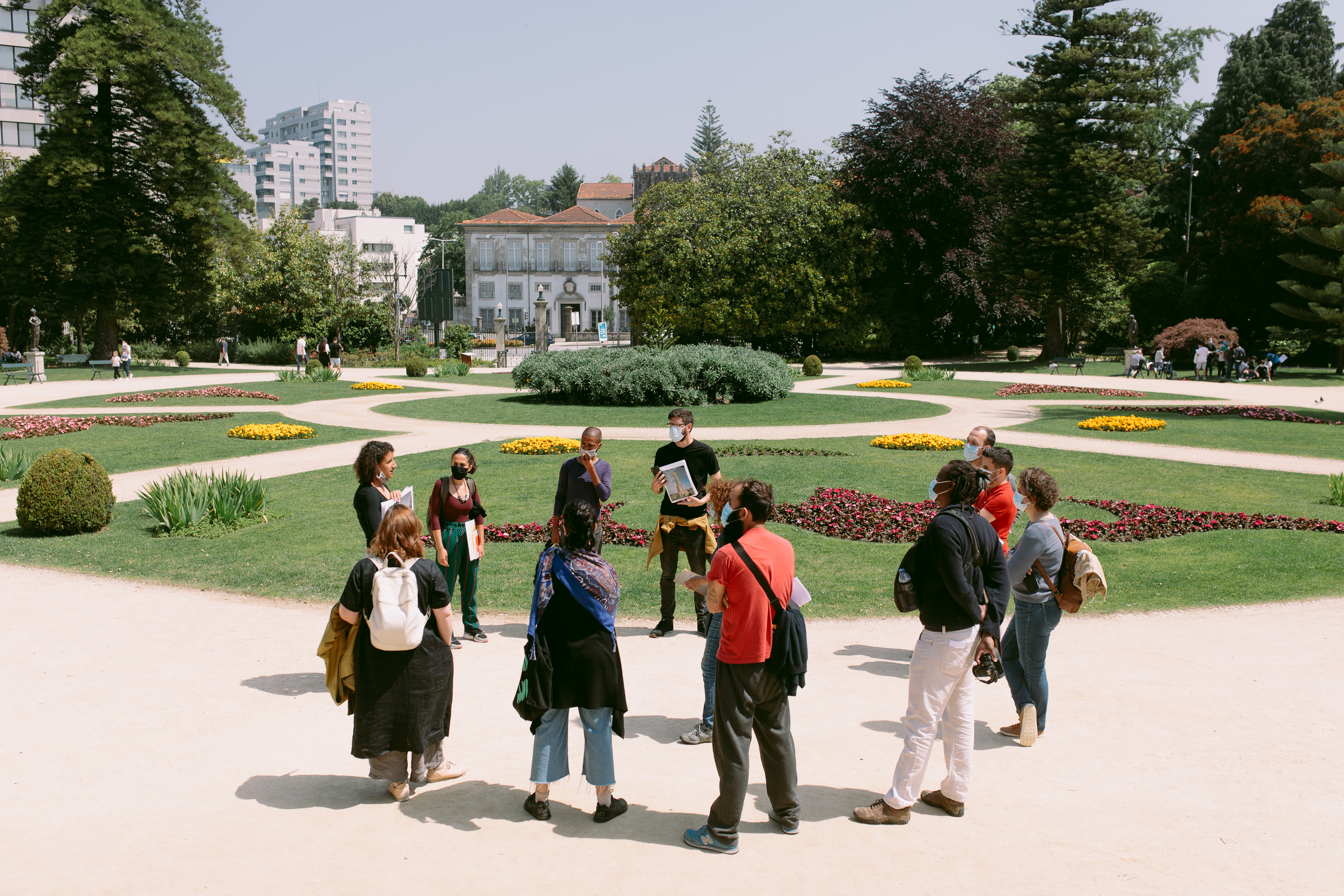

Saturday, May 29, from 10am to 1pm
ATLAS II – Workshop and walk along the gardens with InterStruct Collective
ping! — Programa de Incursão à Galeria
Um Elefante no Palácio de Cristal / Colonialismo, Capitalismo e Religião
In this workshop, a relational cartography will be drawn between images, words and concepts related to the Primeira Exposição Colonial Portuguesa and its legacy.
Due to the relevance of the work developed around the Primeira Exposição Colonial Portuguesa (Porto, Portugal, 1934), InterStruct Collective was invited to carry out the ATLAS project, which crosses and unites the different moments of this program. Created in 2018, the collective aims to foster a dialogue around interculturalism, providing a discursive platform where people from different cultural backgrounds can collaborate, propose interventions and stage artistic projects of social significance. InterStruct Collective is composed by members and associates are located in countries in Europe and America — Claire Sivier, Desirée Desmarattes, Isabel Stein, Melissa Rodrigues, Miguel F., Sebastian Ioan and Vijay Patel —, allowing for broader points of reference and expanding the discussion.
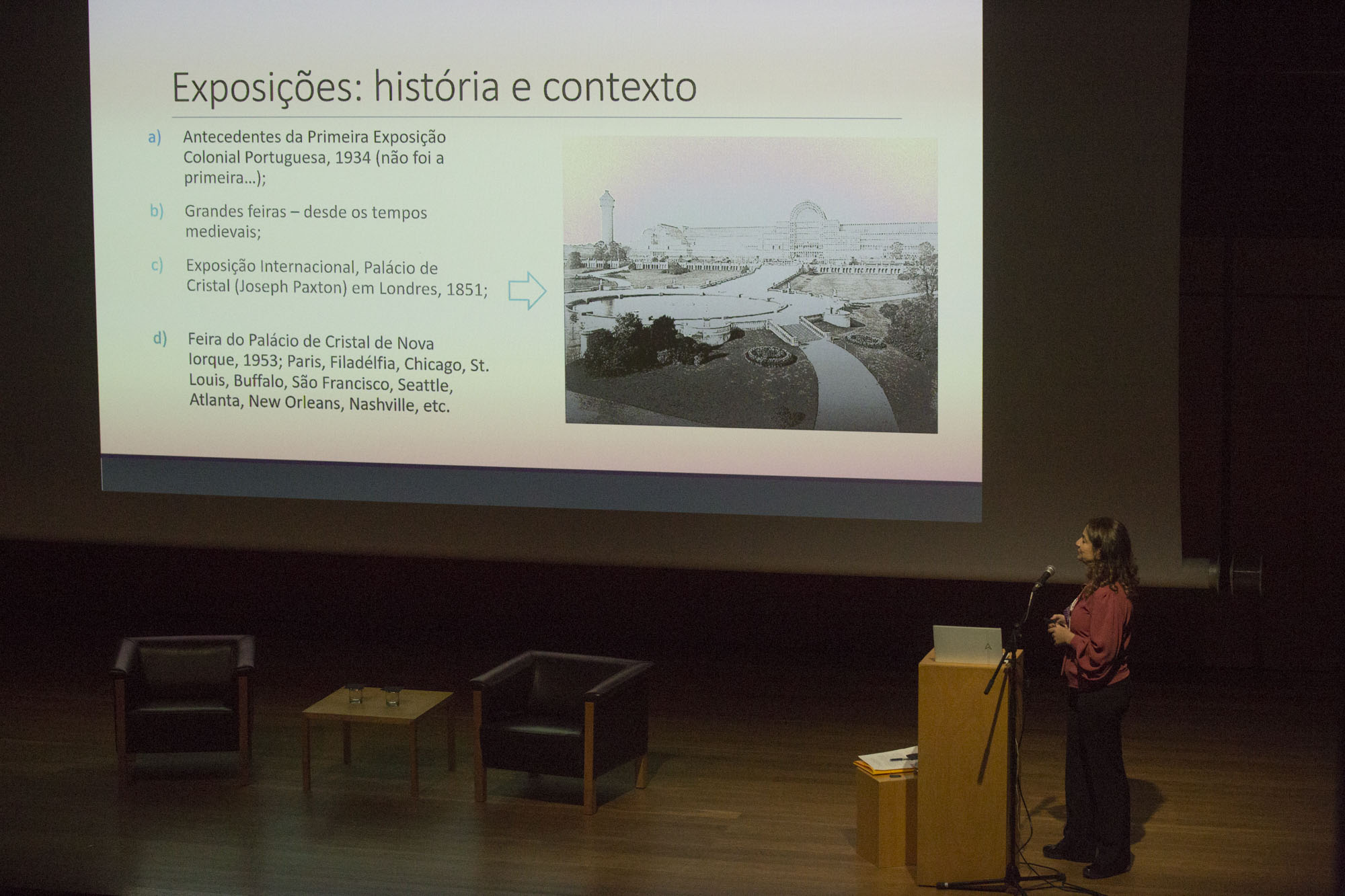

Thursday, June 17, at 7pm
Conference with Patrícia Ferraz de Matos. Moderation by Alexandra Balona
ping! — Programa de Incursão à Galeria
Um Elefante no Palácio de Cristal / Encenação do Império Colonial
A critical, historical and political analysis of the Primeira Exposição Colonial Portuguesa will be proposed in this conference, inserting it into the national and international context, and discussing its vestiges in the collective memory and in the current urban space.
Patrícia Ferraz de Matos is an anthropologist and researcher at the Institute of Social Sciences at the University of Lisbon. Since 2019, she is an associate editor of the Anthropological Journal of European Cultures and a member of the History of Anthropology Network. She holds a PhD in Social and Cultural Anthropology focusing her studies on the history of Portuguese anthropology and colonialism. In 2005, she received the Victor de Sá Contemporary History Prize, awarded by the University of Minho for her research entitled As Côres do Império — Racial Representations in the Portuguese Colonial Empire. She is also the author of A vida e a obra do Professor Mendes Correia (1888–1960): articulações entre antropologia, nacionalismo e colonialismo em Portugal (2011).
Alexandra Balona is licensed in architecture, a researcher, writer and independent curator based in Porto. She is PhD student at the European Graduate School & Lisbon Consortium, with a research on the Political Potentiality of Marlene Monteiro Freitas’ Choreographic Work, supervised by Samuel Weber and Isabel Capeloa Gil. With Sofia Lemos, she co-founded PROSPECTIONS for Art, Education and Knowledge Production, co-curated Metabolic Rifts, and co-edited Metabolic Rifts Reader (2019). She curated Migratory Images – Thinking Lab on Performative Arts in Porto City Theater, is a member of SINAIS DE CENA scientific and editorial board, and publishes regularly on performing arts.
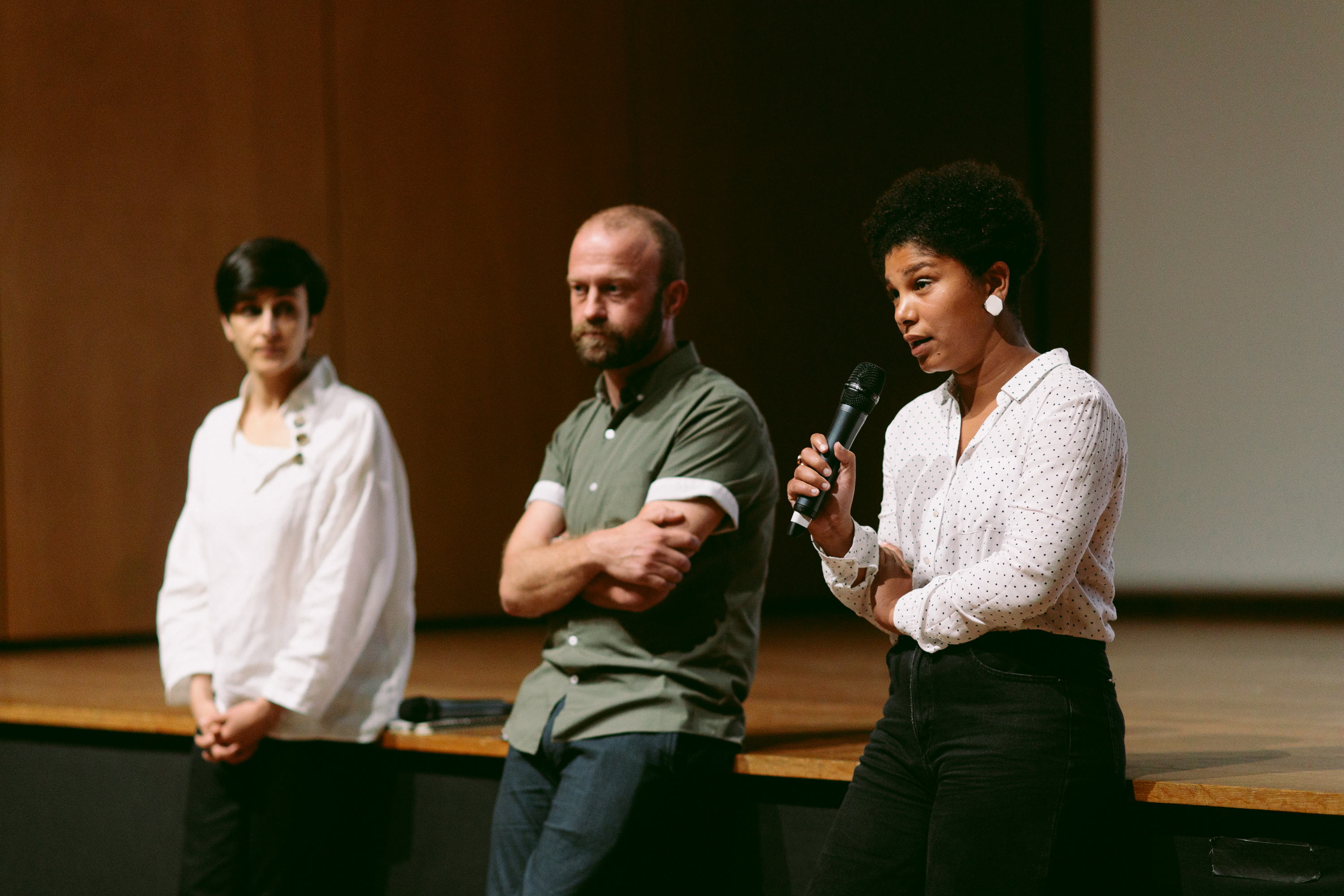

Friday, June 18, at 7pm
Cinema session – Visions of Empire, by Joana Pontes
ping! — Programa de Incursão à Galeria
Um Elefante no Palácio de Cristal / Encenação do Império Colonial
A film about the Portuguese colonial empire as it is seen and shown through photography, from the end of the 19th century until the 1974 revolution that put an end to the political regime that ruled Portugal.
With a PhD in History (specialization in Empires, Colonialism and Post-Colonialism), Joana Pontes also studied Psychology at the Faculty of Psychology and Educational Sciences of the University of Lisbon, and Cinema, at the Lisbon Theatre and Film School. From 2004 to 2008, she was advisor to the Program Directorate of the Portuguese public Television (RTP). Currently, she is dedicated to writing and making documentaries. She is professor at the ESCS - School of Social Communication. In 2007, her documentary O Escritor Prodigioso was awarded the Grande Prémio da Lusofonia. She is co-author of the book A Hora da Liberdade (2012).
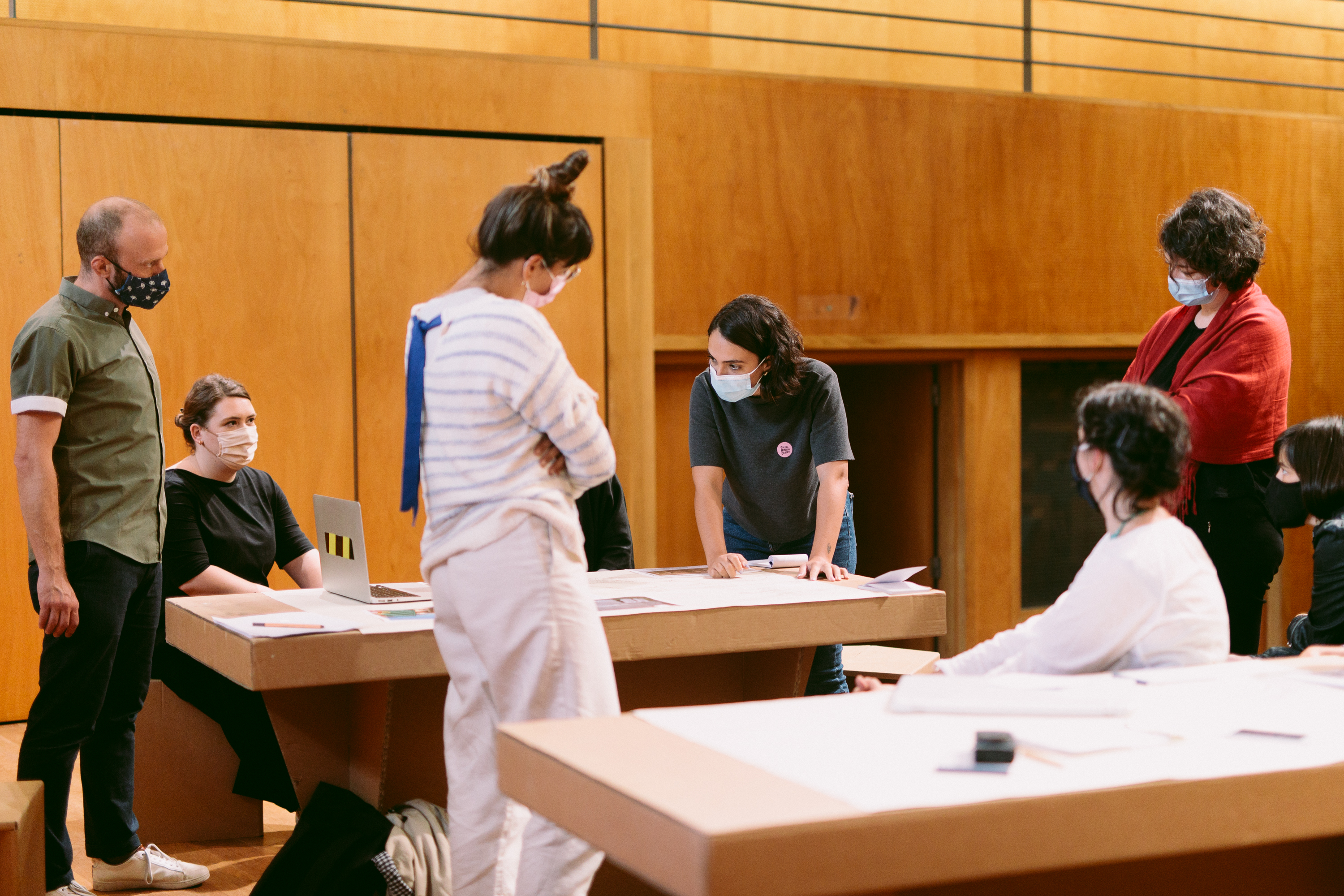

Friday, June 18, from 2pm to 6pm
Workshop with Bárbara Neves Alves
ping! — Programa de Incursão à Galeria
Um Elefante no Palácio de Cristal / Encenação do Império Colonial
In this workshop, which focuses on the Esforço Colonizador Português in Porto, different research, experimentation and criticism practices will be explored to encourage re-inscription of the monument in the public debate and in the space of the city, beginning with its history and materiality.
Designer and researcher, Bárbara Neves Alves received her PhD in Design at Goldsmiths, University of London with an investigation around the concept of miscommunication, which challenges the notion of 'good communication' as a design objective. Lately, in Amsterdam, she has focused her work and research on topics such as communication ecologies, communication policies, noise, participatory methods, socially responsible design and decolonization practices. In addition to her investigations, Bárbara Neves Alves collaborated with the collective Cascoland and has taught as a guest teacher at several higher education institutions in the Netherlands.
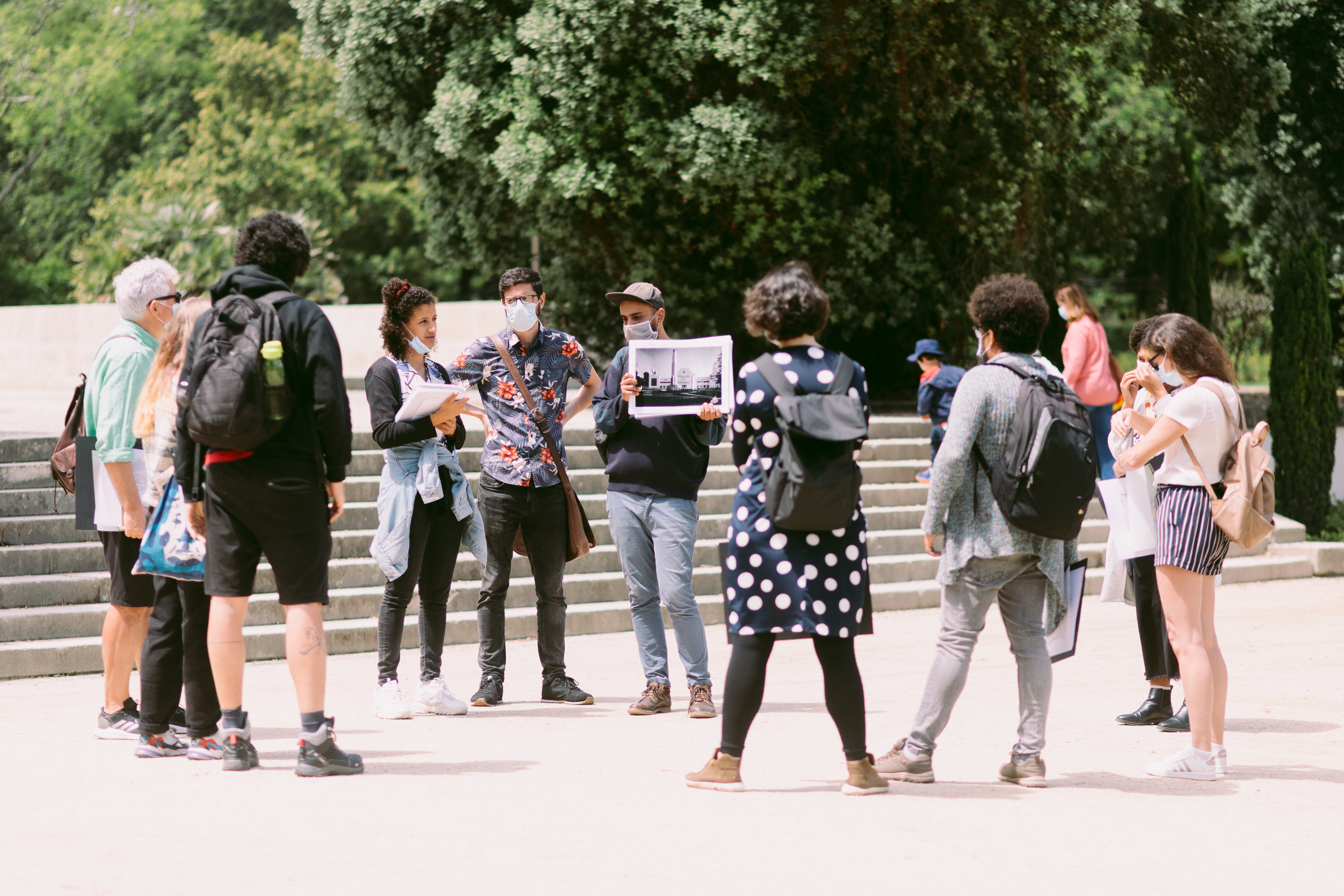

Saturday, June 19, from 10am to 1pm
ATLAS III – Workshop and walk along the gardens with InterStruct Collective
ping! — Programa de Incursão à Galeria
Um Elefante no Palácio de Cristal / Encenação do Império Colonial
In this workshop, a relational cartography will be drawn between images, words and concepts related to the Primeira Exposição Colonial Portuguesa and its legacy.
Due to the relevance of the work developed around the Primeira Exposição Colonial Portuguesa (Porto, Portugal, 1934), InterStruct Collective was invited to carry out the ATLAS project, which crosses and unites the different moments of this program. Created in 2018, the collective aims to foster a dialogue around interculturalism, providing a discursive platform where people from different cultural backgrounds can collaborate, propose interventions and stage artistic projects of social significance. InterStruct Collective is composed by members and associates are located in countries in Europe and America — Claire Sivier, Desirée Desmarattes, Isabel Stein, Melissa Rodrigues, Miguel F., Sebastian Ioan and Vijay Patel —, allowing for broader points of reference and expanding the discussion.
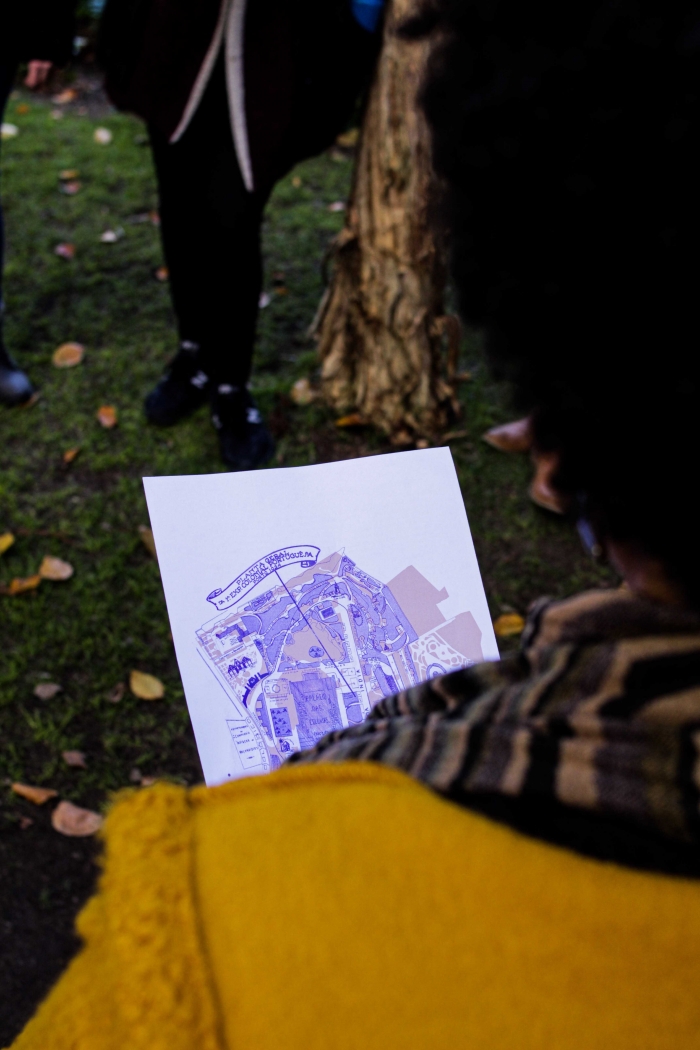

Friday, October 22 at 7pm
Conference with Bruno Sena Martins + Closing of the programme
Bruno Sena Martins will make a presentation entitled A autorrepresentação das vidas negras: entre legados imperiais e resistências ancestrais. A critical, historical and political analysis of the Primeira Exposição Colonial Portuguesa will be proposed in this presentation, inserting it into the national and international context, and discussing its vestiges in the collective memory and in the current urban space.
The conference will be followed by the closing moment of the programme Um Elefante no Palácio de Cristal, part of ping!, and also the presentation of one of the resulting projects, – "ATLAS", designed by the Interstruct Collective.
With a degree in Anthropology and a PhD in Sociology, Bruno Sena Martins is a researcher at CES — Center for Social Studies at the University of Coimbra, where he coordinates the PhD program Human Rights in Contemporary Societies and teaches in the PhD program Post-Colonialism and Global Citizenship. He was vice-president of the CES scientific council, between 2017 and 2019, and co-coordinator of the Democracy, Citizenship and Law center of the same institution, between 2013 and 2016. He has researched and published on topics such as body, disability, human rights, racism and colonialism and is a co-author of several books, among which Não Posso Ser Quem Somos? (2020) and Quem Precisa dos Direitos Humanos? (2019).
